Kelly, KS, the cultural center of Nemaha County. Continue reading
My dad’s brother, Rev. Vincent Wavada, OSB (known to us as Fr. Joe),1 was a very interesting person. I first met him when I was in grade school. At the time he was living in Burlington, IA. I am not sure if Burlington was our destination or we were stopping there on a trip to somewhere else. He was a Benedictine monk. Maybe he was living in a monastery there. Since he had a masters degree in economics from the University of Chicago, maybe he was teaching. I don’t know, and I can think of no way of researching this.
At some point Fr. Joe was transferred by the abbot to St. Bede’s parish in Kelly, KS. He was certainly there in 1961; he might have arrived a little earlier. St. Bede’s church is by far the most prominent building in Kelly, which in my day was the home of a few hundred German Catholics and one Wavada. Next to the church was the rectory. Behind the rectory were pens for his two hunting dogs, Hans, a German shorthaired pointer, and Mimi, a Brittany Spaniel.
The rectory had two or three bedrooms upstairs. Fr. Joe slept in one, and I stayed in the guest bedroom. Downstairs was a kitchen, a dining room, and an office. His housekeeper for decades was Mrs. Kohake.2
All the roads in Kelly were dirt or gravel. When you encountered another car on a road, you were expected to wave to them, even if you did not know them. The roads were also straight. There is no reason to put a curve in a road in this part of Kansas. The roads ran north-south or east-west.
 Downtown Kelly was just a couple of blocks from the church and rectory, but people in Kelly did not use the word “blocks”. I have marked out the downtown area in blue. The only building that I ever went into was the Post Office, which was on the northwest corner. It was also a general store and maybe a gas station. When I was there the largest building across the street was a feed and seed store. There might have been a bank of sorts when I first started going to Kelly. I don’t know what the other buildings were.
Downtown Kelly was just a couple of blocks from the church and rectory, but people in Kelly did not use the word “blocks”. I have marked out the downtown area in blue. The only building that I ever went into was the Post Office, which was on the northwest corner. It was also a general store and maybe a gas station. When I was there the largest building across the street was a feed and seed store. There might have been a bank of sorts when I first started going to Kelly. I don’t know what the other buildings were.
When I was there, Kelly had a grade school and a high school, but I am pretty sure that both of them have been closed for quite a few years.
As you may have guessed, just about everyone in Kelly aside from my uncle, the postmistress, and the guy who ran the feed store, was a farmer. The Post office was in operation for a century, but it closed in 1988. Also, just about everyone in Kelly aside from my uncle was German.
My dad, Fr. Joe, and I would often play golf together, usually at the closest course in Seneca. It was quite an experience. There were only nine holes, and there was no clubhouse. Near the first tee was a metal box in which you were supposed to insert your green fees. Right in the middle of the course was an air strip that was marked with out-of bounds stakes. I seem to remember a plane landing there at least once. After landing the occupants of the plane left it on the side of the air strip and walked away. There was nothing resembling an airport.
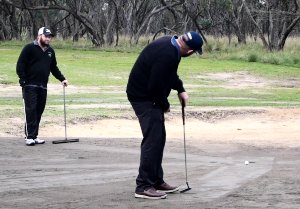 The most striking feature of the course was the fact that it had perfectly flat sand greens. They were quite small, perhaps 30-50% of the size usually associated with greens. The sand was not deep, and it was oiled. It was nothing like being in a sand trap. Each green was equipped with a rake and a roller. When you got your ball on the green, you used the roller to smooth out the sand from the hole to where your ball was. You then putted on the smoothed-out surface.
The most striking feature of the course was the fact that it had perfectly flat sand greens. They were quite small, perhaps 30-50% of the size usually associated with greens. The sand was not deep, and it was oiled. It was nothing like being in a sand trap. Each green was equipped with a rake and a roller. When you got your ball on the green, you used the roller to smooth out the sand from the hole to where your ball was. You then putted on the smoothed-out surface.
It was no more difficult to judge the speed of putts than on a flat grass surface and much easier than on a hilly grass surface. Moreover, this being Kansas, you did not really need to worry much about the putt breaking one way or the other. Three-putting was almost unheard of.
It was, however, quite difficult to make an iron shot stop on the green. There was no “bite”. You had to leave the shot short and hope that the ball bounced or rolled onto the green and then ran out of steam.
The course had no watering system, and in late summer it was similar to playing on asphalt with patches here and there of grass and weeds. Nevertheless, I enjoyed playing here immensely. A few times Fr. Joe and I played during my annual stay. He always had a better score than I did, and that bothered me. I took the game much too seriously.
When Fr. Joe moved to Kelly, he was an avid hunter. However, he soon traded in his rifle or shotgun for a camera. He would take his dogs out to scare up pheasants or quail. I wasn’t even slightly interested in this activity, but I did learn to make a respectable quail call, which sounds like “Bob White”.
We did go fishing together, at least one evening per week. I had my own fishing rod and some lures. Fr. Joe used his fly rod if we were fishing in a farmer’s pond, or a regular rod if we went to the small lake that was nearby. I used to drive him crazy because I could not stop myself from calculating the percentage of bites that we got per cast and the percentage of fish we caught per nibble. We did catch a few. I am pretty sure that I caught at least one. My recollection is that our most common victims were crappie and bluegill. We usually threw the crappies back.
Being an early riser, I usually was up and about a little before Fr. Joe. Once or twice I saw him shave. He used a straight razor, which he kept sharp with a leather strop. I thought that that was really cool.
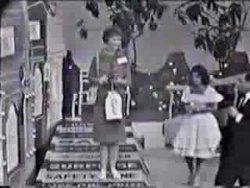 During the day Fr. Joe was often busy with church stuff. I would watch TV, the antenna of which was capable of receiving two channels, #2 from St. Joseph, MO, and #13 from Topeka, KS. I remember watching lots of game shows. My favorite was Video Village. I also watched the wrestling shows from St. Joe on Saturday morning. This was a particular treat that I could not enjoy at home.
During the day Fr. Joe was often busy with church stuff. I would watch TV, the antenna of which was capable of receiving two channels, #2 from St. Joseph, MO, and #13 from Topeka, KS. I remember watching lots of game shows. My favorite was Video Village. I also watched the wrestling shows from St. Joe on Saturday morning. This was a particular treat that I could not enjoy at home.
I had no trouble keeping myself occupied. I often pitched golf balls in the side yard. No one cared if I replaced my divots. I would occasionally go for fairly long walks. It was not exactly scenic, but every so often something would catch my attention.
Fr. Joe was an accomplished artist. Unfortunately, at the time I had not the slightest interest in the subject. When he came to visit us, Fr. Joe, my mom, and I would sometimes go to the Nelson Gallery of Art. I can’t say that these were my favorite times.
 The three of us also went to a few movies. One was Dr. Zhivago. I complained about the scene at the end, where they are standing on a dam and talking about progress. He explained why this device was necessary from a literary perspective, but I didn’t buy it. The actual dam, by the way, is on the border of Spain and Portugal!
The three of us also went to a few movies. One was Dr. Zhivago. I complained about the scene at the end, where they are standing on a dam and talking about progress. He explained why this device was necessary from a literary perspective, but I didn’t buy it. The actual dam, by the way, is on the border of Spain and Portugal!
What I did enjoy was talking about books. Fr. Joe had read essentially everything worth reading. At the time I was most entertained by murder mysteries, but I had an open mind. When he came to KC, we always went to at least one bookstore. I think that the thing that he liked the least about living in Kelly was that there were no decent bookstores anywhere in the area. He had probably read more books than the rest of Kelly combined.
I also went to church, at least on Sundays. I was startled by the fact that Fr. Joe was a terrible preacher. I don’t know if he just hated the idea of preaching to people, or if he had never had any training in public speaking. There was no emotion whatever in his presentation, and his delivery was full of verbal stops. This actually shocked me, because 1) my dad was a prize-winning speaker, and 2) until this point it seemed reasonable to conclude that Fr. Joe was good at everything.
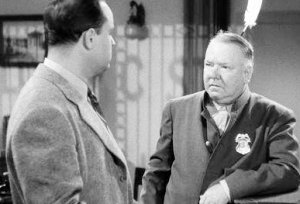 Fr. Joe introduced me to the comedy of the Marx Brothers and W.C. Fields. I have watched all of their films, and many of them I have watched multiple times. I have performed Fields’s “You’ve got to take a chance when you’re young” routine from The Bank Dick countless times at the bridge table. It always breaks people up.
Fr. Joe introduced me to the comedy of the Marx Brothers and W.C. Fields. I have watched all of their films, and many of them I have watched multiple times. I have performed Fields’s “You’ve got to take a chance when you’re young” routine from The Bank Dick countless times at the bridge table. It always breaks people up.
One thing that I did not do is listen to music. I did not bring any of my records, and I was not crazy about Fr. Joe’s. I also left my transistor radio at home. There was no hope of picking up a station that played Top 40 songs.
My sister Jamie worshiped Father Joe. For some reason they called each other “Stink”. After I graduated from college and left for the army, she started spending time in the summers in Kelly, as I had. I am not sure how she spent her time there. I seldom saw her until she moved to New England many years later.
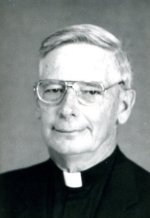 1. Fr. Joe died in 1990. His obituary is here.
1. Fr. Joe died in 1990. His obituary is here.
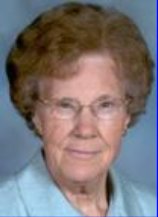 2. Mrs. Kohake died in 2007. Her obituary is here.
2. Mrs. Kohake died in 2007. Her obituary is here.

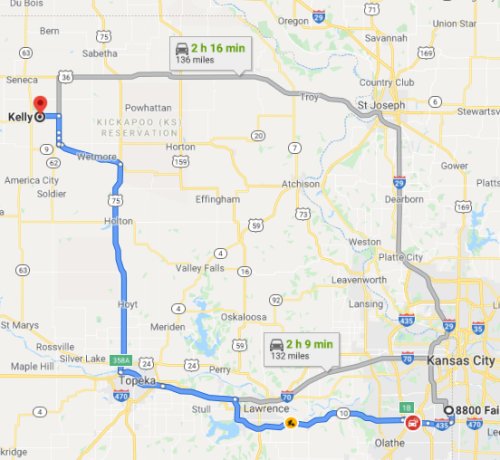
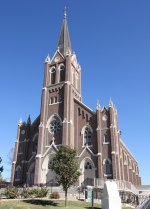
Pingback: 1962-1966 Miscellaneous Part 2: Outside of School | Wavablog